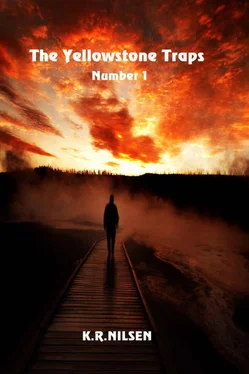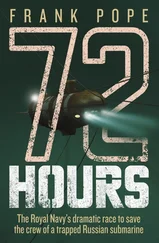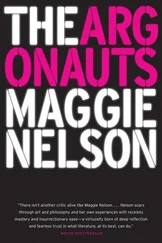Calgary, as cold a metropolis as Russian cities of the Siberian interior, crept over the horizon. As promised, Sinopa delivered Liz to the airport. Specialists from the Cascades Volcano Observatory were on their way from the west coast, bent on employing the international airport as a staging area for the first research helicopter flights into the Yellowstone country. Teams would soon amass gear and personnel for the journey. Liz had every intention of joining fellow scientists on the first trip to edge of the new caldera.
Chapter One Hundred-Twelve
Fierce Yellowstone sunset reds lingered in the evening sky, unblemished by earth’s satellite in dark new-moon phase. As the fires in the stratosphere ebbed, forward legions of solar flare particles entered the ionosphere of earth. The galactic flood of supercharged radiation from the sun, interacting with the earth’s lean outer atmosphere, provided the spark to light the halls of heaven to neon brilliance.
Abel strode across the town common in the darkening hour, a heavy homespun wool sweater over a flannel shirt and long johns. He toyed with worry as he moved through the glassy cold, turning over in his mind imaginary snowscapes shivering under the vicious freeze of the first Yellowstone winter to come. Would weather destroy food crops in the unheated greenhouses? Would the cold bring down Independency?
The man had experienced minus forty-eight once, an unearthly reading. That sort of temperature was heavy air from the northern outrun slopes of the Brooks Range of Alaska come calling. The Siberian gulag camps at Kolema could scarcely be colder. How many such nights would a Yellowstone January yield?
Such temperatures could kill. Deer, huddled in deeryards beneath thick stands of evergreens and weakened by weeks of brute cold, froze to death standing fully erect. Step outside, Abel knew, and one had to pull a scarf across the face to trap the warmth of breath against the flesh. Super cold air could damage tissues in the larynx and lungs.
The man parked a hand on the entrance railing to the CC and turned to survey the snapshot-still, frostbitten landscape of October, then craned his neck to find Cassiopeia, the star queen in her great W-shaped throne of distant suns. In the east, green and red curtains of aurora fluttered across the night sky. Abel was the only customer at the celestial carnie show. Maybe, he thought, a moment might arrive when a single last human remained on the planet to see such a brilliant performance. On all sides, that singular individual would have witnessed his or her companions vanish, children shrivel to bone, the elders crawl into the bush to hasten the end, women go barren for lack of sustenance and civility, and the men war among themselves until the lone victor stood triumphant over a world of ruin and an empire of corpses.
The complex order of things had already been turned on its head, and just in a handful of months, Abel reflected. The whole of it, that frenetic economic marvel machine out there, had been undone by a single geological event. It seemed incomprehensible, the stuff of black magic.
Abel pushed open the door to his upstairs office, seeking the farmer, who had spent his first full day at Independency in the workspace sleeping fitfully and eating little. A cot had been prepared for the guest and food brought up. Penny and Doctor Ruchelshouse had checked in on him often, Abel, too, when he awoke from his sleep of exhaustion.
Harland lay awake on the cot, breath rattling in his throat, the glow of a single nightlight illuminating his weathered, sharply angular Scandinavian features and tightly cropped white hair. The low wattage light shed an aura of severity over Harland’s wiry frame. He could not bring himself to lift his eyes to acknowledge the being entering the room.
Abel took a seat in a chair at the foot of Harland’s cot and sat in silence for several minutes, trying to settle on an opening inquiry that might free up the farmer’s tongue.
“Did the doctor come to see you, Harland?”
“Um.”
“Did he examine you a bit?”
“He did.”
“What did he have to say?”
“Dust pneumonia. I got it. Ain’t going away.”
“Are you feeling well enough to walk down a few flights of stairs and go over to the CC?”
“What do you want now?”
“I’d like to show you something. I think it’s something you should see.”
“What?”
“It’s difficult to describe. Best to see for yourself.”
The men slowly tramped the stair treads and made their way to the CC kitchen. In the dark interior of the building, Abel led Harland to the unlit dining hall, crossed the room and pushed open double doors to the main meeting hall. A cloud of cold air muscled through the opening as the men stepped through. Abel closed the doors.
The floor and scores of chairs flickered with the haunted colors of the aurora cascading through the windows. Engulfed in the pure reds and greens of electromagnetic radiation streaming into the room, Harland sensed the place was in utter disarray, chairs scattered, tipped over, the once orderly rows wildly askew. The to-the-marrow cold in the great-enclosed space suggested malfunction, the black shadows, malevolence.
Narrow shafts of color hijacked Harland’s attention. Across the space, beams of aurora pigments ran laser straight, entering from holes in one of the walls and racing through the dimensions. Intrigued by the lines of light, Harland went to the dark interior plaster surface and pressed his fingers against one of the entrance points where the photons invaded. Harland sensed what he was feeling was actually a bullet hole.
“You brought me here to see this?” Harland said, spinning about searching for Abel. The host had his back to the doors the men had entered.
“Yes, I did.” At that, Abel threw light switches by the doors and the room blossomed with electric light.
Having spent hours in feeble light, Harland squinted beneath the hard glare of the fully illuminated hall. With the brilliant rays of light came reflections from plaster rubble and dust, wood siding fragments, glittering glass shards, brown pools of coagulated fluid and spatter droplets of rust color on white satin latex paint.
“Jesus, this looks like something out of Nam,” blurted Harland. “What happened here?”
Abel flipped the lights off again to let the aurora borealis back in the room. Several slow steps and the Abel closed in on the farmer, too close, and made direct eye contact. Harland looked way. “I thought you could tell me, Harland.”
Surprised, Harland returned the man’s gaze. “What? Me?”
Abel sidestepped to the ruined exterior wall and padded along it, thrusting an arm through the naked spaces where window glass and frames had been. Silhouetted against the billowing colors of the aurora, the town founder held up a fist and snarled into the cold. “Who did this, Harland?”
The farmer stood stone quiet.
Abel emptied his lungs. “You know who is responsible for this!”
Apprehension welling up in flood, Harland backed away from the black form hanging in a window opening.
“Don’t move a damn muscle,” Abel vented in tones sharp with threat. “We had people die here in this room.”
Harland welded his mouth shut and frantically scanned the walls of the hall to see if others were lurking in the recesses ready to pounce.
“Farmer, tomorrow we are going back to your town with a shipment of our food. We agreed to it. It’s going to happen. But you and I aren’t leaving this little corner of hell until you make clear to me why, okay, why it was necessary for your son to come here and murder my daughter and two others.”
Abel’s words struck like a prizefighter blow to the stomach.
Читать дальше










